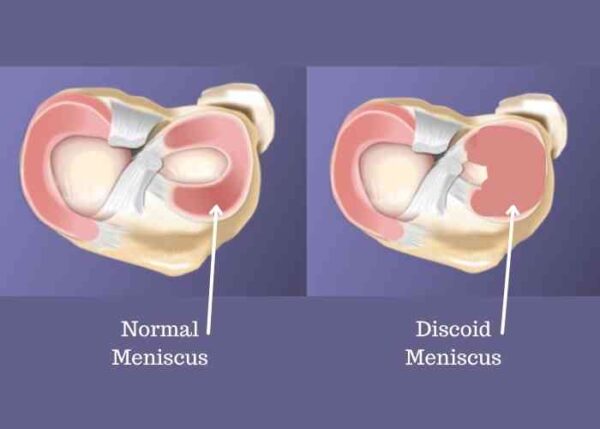Discoid Meniscus Repair and Reconstruction Surgeon

Have you been diagnosed with a discoid meniscus? Discoid menisci are irregularly shaped and are prone to injury. Discoid menisci can also degenerate more rapidly than a typical c-shaped meniscus. Doctor Riley J. Williams provides diagnosis as well as surgical and nonsurgical treatment options for patients in Manhattan, Brooklyn, New York City and surrounding areas who have a discoid meniscus in the knee. Contact Dr. Williams’ team today!
What is discoid meniscus repair or reconstruction?
Discoid meniscus repair or discoid meniscus reconstruction can be necessary for patients who have a discoid meniscus. Discoid menisci are irregularly shaped and are prone to injury. Discoid menisci can also degenerate more rapidly than a typical c-shaped meniscus. Discoid meniscus repair is an operative treatment that involves restoring the meniscus to a relatively healthy configuration or reconstructing it to resemble a normal meniscus.

What is a discoid meniscus?
A healthy meniscus is crescent-shaped, tough, rubbery cartilage located in the knee joint between the femur (thighbone) and the tibia (shinbone). Each knee has two menisci, one lateral (on the outside) and one medial (on the inside). They act as shock absorbers between the tibia and femur during locomotion (walking, running, sports), and help stabilize the joint. A discoid meniscus is irregularly shaped, often oval-shaped. It can also be thicker than normal, which makes the meniscus more prone to injury, tears and pain that can start as early as childhood. Essentially, a discoid meniscus is larger and thicker than a normal meniscus; too much meniscus tissue persists during embryonic development and leads to a discoid shape. Many individuals can go their entire lives without experiencing issues from their discoid meniscus; however, those who do may require discoid meniscus repair or reconstruction. There are three types of discoid menisci:
- Complete: The meniscus covers the tibia (shinbone) entirely
- Incomplete: The meniscus is thicker or wider than normal
- Hypermobile Wrisberg: The ligaments that attach the menisci to the tibia and femur (thigh bone) do not exist, which causes popping, locking and pain in the knee
How is discoid meniscus repair performed?
Surgery is done arthroscopically under anesthesia. The arthroscopic procedure is done by making small incisions in the knee where Dr. Williams is able to insert a small tube with a camera attached to the end, an arthroscope. The images are displayed on a monitor enabling Dr. Williams to use small, specialized surgical instruments to perform the discoid meniscus reconstruction. The type of surgery performed is based on which kind of discoid meniscus exists. Complete and incomplete are typically treated with saucerization or partial resection; this procedure, involves cutting and reshaping the meniscus into a healthy, normal crescent shape. If the discoid meniscus is also torn, Dr. Williams may need to not only re-shape the meniscus, but also trim away any damaged meniscal tissue. If an individual has a hypermobile (Wrisberg) discoid meniscus, saucerization may be required as well as sewing the meniscus to the joint lining (meniscus repair).
What are the risks in discoid meniscus repair or reconstruction?
The outcome of reconstructive meniscal surgery has a high success rate. The risks of surgery are low. Rare complication including bleeding, infection and nerve/blood vessel injury are possible, but very atypical.
How long does it take to recover from discoid meniscus repair?
Patients must follow a strict physical therapy regiment to ensure proper healing after a period of 1-2 weeks of protected weight bearing. The meniscus can take longer to heal because of its location in the body where there is minimal blood supply. It is important to avoid activities, such as high impact sports, deep squatting, sitting cross-legged and heavy lifting for a minimum of four months.
For additional resources on discoid meniscus repair, discoid meniscus reconstruction or to have your knee pain evaluated, please contact the office of Dr. Riley J. Williams, orthopedic knee surgeon serving Manhattan, Brooklyn, New York City, NY and surrounding areas.
Locations
610 W 58th Street
New York, NY 10019
148 39th Street, 7th Floor
Brooklyn, NY 11232


